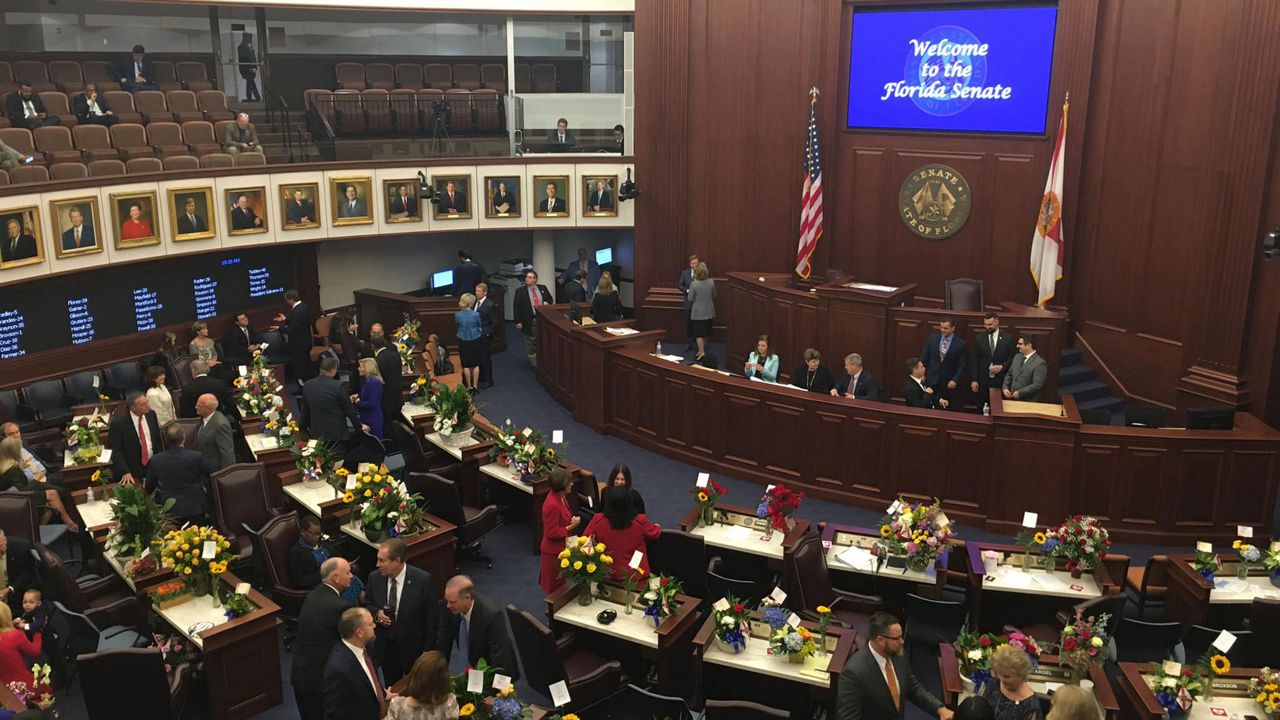The Supreme Court appeared poised to allow former President Donald Trump on the ballot in Colorado, and a debate rages in Tallahassee on a monument protection proposal.
RELATED LINKS
Supreme Court hears arguments in Trump ballot question
It was a historic day at the Supreme Court in Washington, D.C.
Justices heard arguments on whether former President Donald Trump can be disqualified from appearing on ballots this year due to his alleged involvement in the January 6th insurrection at the U.S. Capitol in 2021.
Trump was not present.
The Supreme Court is reviewing a ruling by Colorado’s highest court that former President Donald Trump is ineligible to appear on that state’s ballot under a Constitutional Amendment that bars insurrectionists from federal office.
But during oral arguments Thursday, the high court’s liberal and conservative justices appeared unwilling to accept the Colorado decision.
Chief Justice John Roberts, a conservative, worried that allowing one state to knock a presidential candidate from the ballot could trigger a series of tit-for-tat decisions by other states.
“I would expect that a goodly number of states will say wherever the Democratic candidate is, you’re off the ballot and others for the Republican candidate, you’re off the ballot, it will come down to just a handful of states that are going to decide the presidential election. That’s a pretty daunting consequence,” Roberts said.
Justice Elena Kagan, one of the court’s liberals, said if the Colorado ruling stands, one state could decide for the rest of the country who is permitted to run.
“Like what’s the state doing, deciding who gets to who other citizens get to vote for president?” Kagan said.
The back and forth reflected a debate about whether individual states or congress should decide whether the 14th Amendment applies to presidential candidates.
The justices indicated they believe such a determination only could be made by Congress.
In knocking Trump from the ballot, Colorado’s top court cited his conduct before and during the riot by his supporters on January 6, 2021.
But only a small part of Thursday’s hearing dealt with whether Trump should be considered an insurrectionist.
Only Colorado and Maine have removed Trump from the ballot, although some other states appear to be waiting are waiting for the high court to rule.
Debate rages on monument protection bill in committee hearing
The Senate Community Affairs Committee in Tallahassee considered Senate Bill 1122, The Protection of Historical Monuments and Memorials.
The debate, especially with public comment, was very heated, and went for an hour and 40 minutes, just on the one bill. We’re going beyond the soundbite tonight to give viewers a broader sense of the discussion between lawmakers and members of the public.
The bill has one more scheduled committee stop, in fiscal policy, before it moves to the full Senate for a vote. The companion house bill, HB 395, has two more scheduled committee stops before heading to the house floor.
A bill to keep track of dangerous dogs moves forward
New restrictions and requirements could be coming for some dog owners in Florida.
Proposed legislation in Tallahassee would create a registry for dangerous dogs where people can check on animals living in their neighborhood.
The State Senate Agriculture Committee voted in favor of the bill last week.
State Sen. Jay Collins discussed the potential registry, which is being named “The Pam Rock bill” in honor of a woman who was killed by five dogs in Putnam County.
Rock’s brother, Tom, says it would give owners tougher penalties to prevent violent attacks.
“This is sad. What’s worse is it’s preventable. So you can be on the good guy team and help us stop them. Hear the cries of the Florida victims and help us pass this legislation now,” Rock said.
“Believe me when I tell you, it’s not something I’d ever want to do to take away someone’s dog rights or to grow government. It is one of those areas that I am diametrically opposed to. That being said, you’ve listened to the stories. It’s real,” Collins said. He sponsored the bill.
The committee unanimously approved the bill. It would exclude police dogs and hunting dogs from the registry if passed.
However, a dog expert we spoke to says he’d like to see an emphasis put on training and rehabilitation.
Chris Meverden has been training dogs for years.
“I’ve been doing this for 13 years, and this has been my dream is to have a facility like this,” Meverden said. He owns North Tampa Dog Training.
In the last year, he moved his operation to nearly eight acres of land in New Port Richey, growing the real estate of his business and his home.
“It just makes it great for, you know, the dogs as far as having all this, you know, resources for them to, you know, for training and stuff like that,” Meverden said.
Doing what’s best for the betterment of the dogs he works with is always his primary goal.
“Having a good relationship with their owners and the fact that the dog has a better quality of life, being able to experience the world, you know, instead of just being locked in the backyard or, you know, you know, in a crate or, you know, a kennel,” he said.
He said it’s very rare to have a dog that can’t be rehabilitated from dangerous behavior like biting.
So when Meverden sees state legislation like House Bill 873 and Senate Bill 1156 that would create a statewide registry for dogs deemed “dangerous,” he says it won’t get rid of the root issue.
“I don’t think that the problem of dog bites, fatalities and stuff like that is going to be solved by legislatures in Tallahassee,” he said.
According to the Senate bill, if a dog is declared dangerous, owners have to put them in a proper enclosure, get liability insurance, put permanent identification like a tattoo or microchip in the dog, and notify animal control if the dog is loose, sold, or moving to a new address.









